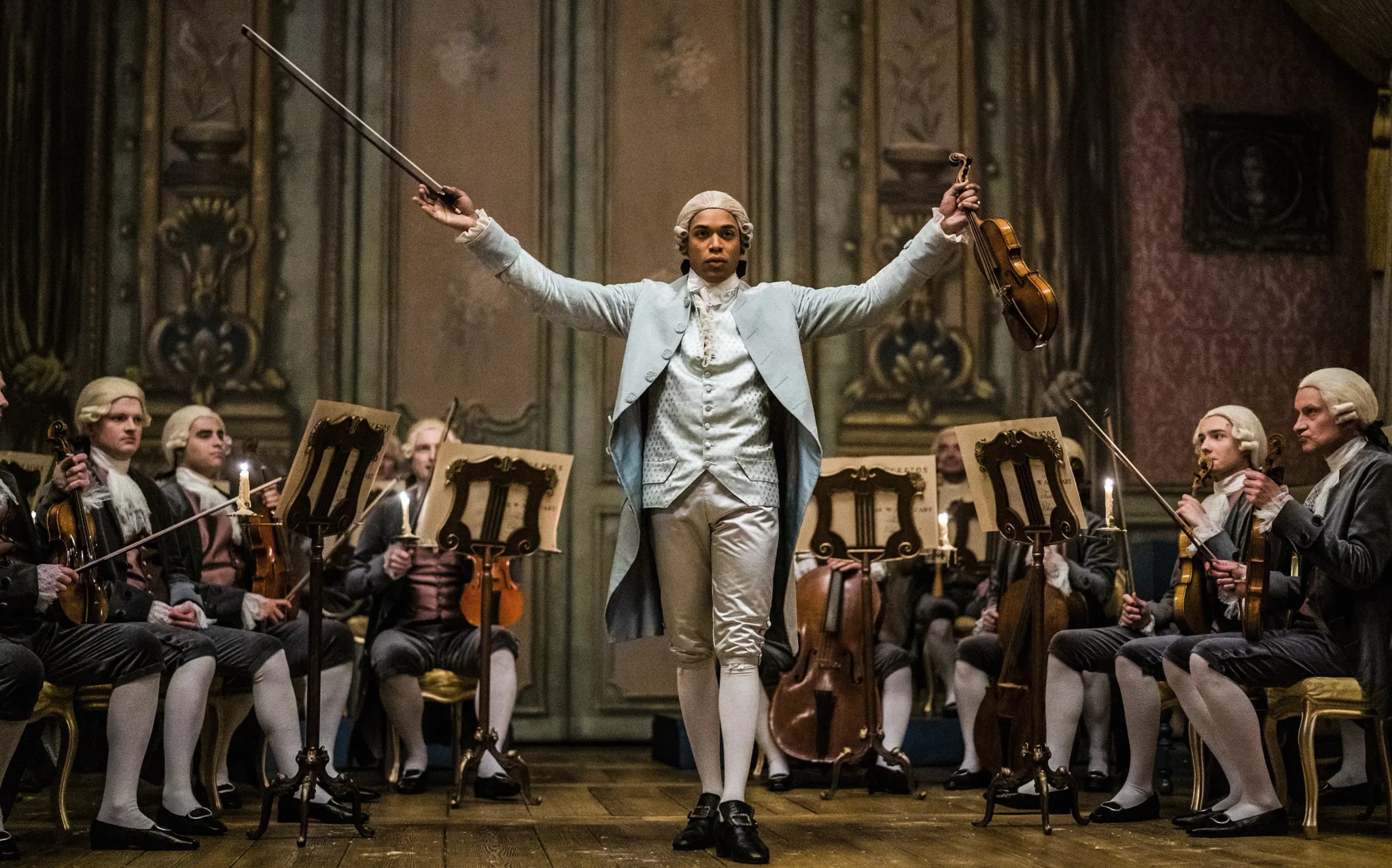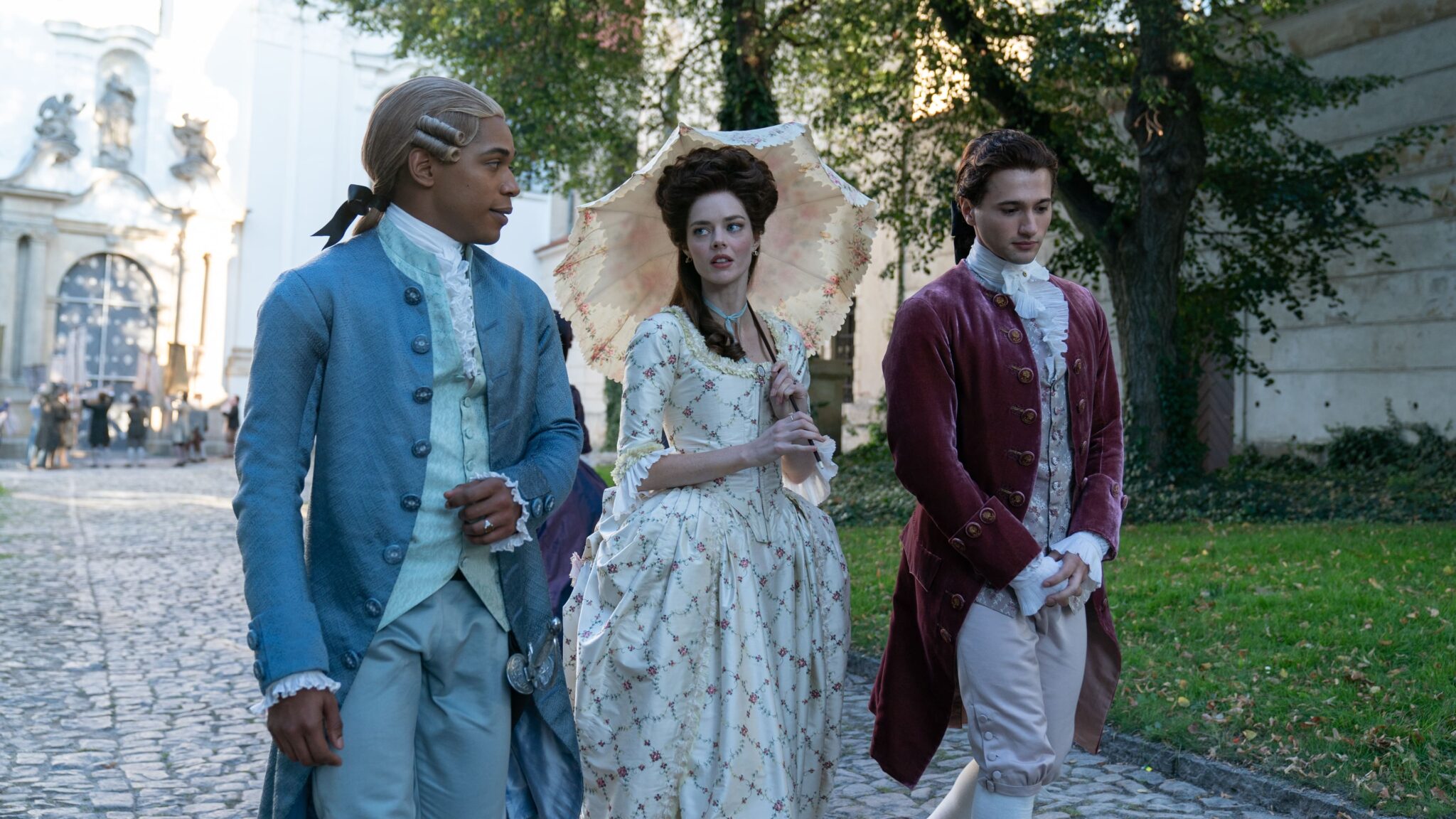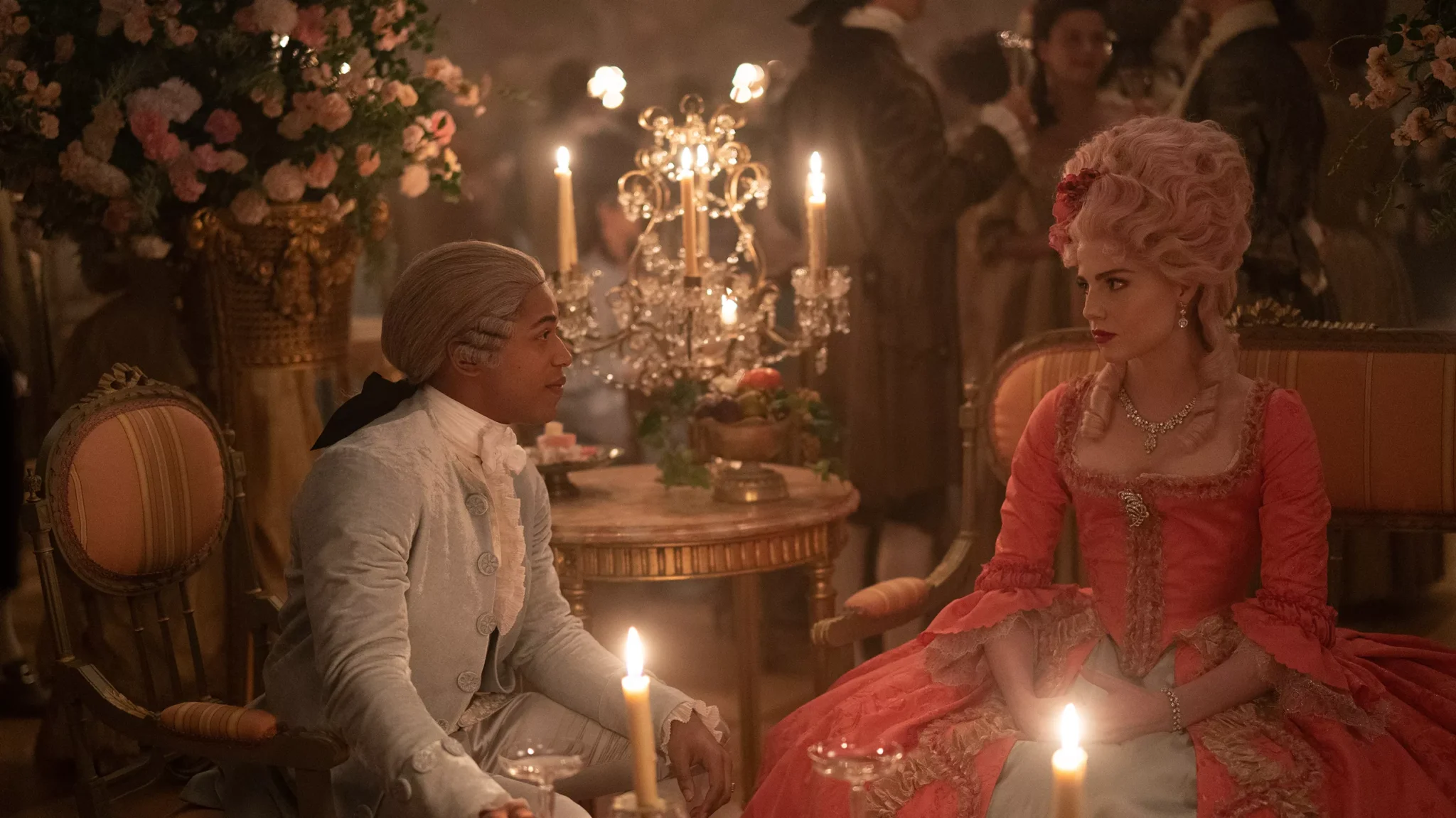I liked a lot of Chevalier, a handsomely mounted biopic about Jospeh Bolonge (Kelvin Harrison, Jr.), one of Europe’s first Black composers. But like many films above a certain budget, it suffers from a failure of nerve. The film feels like it will build to an explosion only to end with an epilogue telling us facts that would have been much more interesting to see than to read.
The beginning of Stephen Williams’s Chevalier promises to be a bold and aggressive biopic—a violin duel between Mozart and the young upstart Harrison’s Bologne. Immaculately lit and staged, the duel escalates until Mozart storms off stage, leaving Bologne on stage, the crowd roaring with applause. Mozart rails at his stage crew, “Who the fuck is that?”

It’s a hell of a way to start a film. Stefani Robinson’s script sometimes cackles with possibilities, filled with moments that dare to rip off the reserved aura of polite society. But, regrettably, the film reveals itself to be rather staid and traditional.
However, Harrison bristles with such an electric and sensual charisma that it’s impossible to tear your eyes off the screen. Bold and brash, it is a reminder that the complaint about the lack of movie stars seems silly when talents like Harrison are around.
Pity that Chevalier never seems to be as cocksure as its protagonist. Understand, this biopic is about the first Black European composer and his rise through the French aristocracy; all the while, the beginnings French Revolution rumble in the background, which is never dull. But it is also never as revolutionary as Bolonge himself. And for all the talk about “liberate,” we see precious little of the revolution.
Williams and Robinson use the French Revolution as the background radiation of Chevalier. It is always there, threatening to burst from the background into the main story. But Williams never shows us the squalor of the average white or Black Frenchman, so we understand why it is even happening. Of course, the French Revolution is a violent and bloody upheaval of historic proportions, and there are more than a few similarities to our present state of affairs. Still, neither Williams nor Robinson ever does much to show us the world outside of Bologne’s.
Indeed, Williams and Robinson use the French Revolution for little more than background noise. That is until it becomes time to bring the revolution to the foreground, but by then, we’ve seen so little of it that it never really has any resonance. Williams and Robinson pack Chevalier chock full of revolutionary talk but with almost no action.
Born the son of a French plantation owner, his mother a slave Nanon (Ronke Adekoleuejo). We have never heard of his rise to prominence under Queen Marie Antoinette (Lucy Boynton) because Napoleon attempted to destroy all traces of Bologne. Harrsion’s Bologne is a dashing and rightfully arrogant violinist. He is a virtuoso with both the instrument and the ladies until he hears Marie-Josephine de Montalembert (Samara Weaving) sing at a party. Stricken by her beauty and talent, the two begin an illicit affair.
The blossoming love affair between Joseph and Marie-Josephine is the center of the movie, and had Williams and Robinson been content with that, Chevalier might have been better. Harrison overflows with a sensual magnetism, and Weaving manages to say more by chewing her bottom lip than whole swaths of dialogue would be able to tell us. The two have an intense rapport that reveals itself in Robinson’s conversation.

Chevalier may not be as alive and unpredictable as I want it, but Williams and Robinson also do an excellent job of never making it feel like a textbook. It never feels as if we are being force-fed our vegetables.
Partly, this is due to Jess Hall’s camera, which captures every frame so beautifully that it gives Chevalier an almost painterly quality without the stiffness. Whatever complaint I may have, Williams and Hall have delivered a beautiful movie, lit with a light exacting touch. The result is that even when the film disappoints, it never fully disappoints.
Marie-Josephine is married to the Marquis de Montalembert (Marton Csokas), a role best described as a Ben Mendelsohn role. A brutish man who disapproves of Bologne’s skin color and the theater. The reasoning behind why Marquis will not let his wife be in Joseph’s opera sound suspiciously similar to a certain Florida governor.
It’s impossible to watch Chevalier and not think of today’s political climate. Williams and Robinson try to make some allusions, but unlike How to Blow Up a Pipeline (which, by the way, I totally recommend), it sacrifices its political radicalism for the neat & tidy payoff. The irony is that the end feels airless and empty because of this.
Robinson’s script attempts to show us how Joseph rises to the top only to be pushed back down because of his Blackness and eventually becomes a composes for the revolution. Yet, it feels trite without showing us what that revolution looks like, without having that contrast of his life compared to the average French citizen.
Joseph is also an accomplished fencer. We see this in the beginning during one of the film’s best sequences in which Williams, Hall, and editor John Axelrad, give us a glimpse of a much more lively and dangerous movie. Joseph fences against a white Frenchman while another man argues about the purity of the white race. On Joseph’s side is his close friend and revolutionary leader, Louis Phillipe II (Alex Fitzalan), who argues for Joseph’s right to be a Frenchman. Axelrad cuts the debate intertwined with the fencing, making the points feel all the more immediate and dangerous. After all, any discussion in which the oppressors are forced to listen to the oppressed often is.

The real tragedy that gets lost in Chevalier is the relationship between Joseph and his mother, Nanon. When his father dies, his mother is freed and comes to live with Joseph. Nanon is quickly reduced to a cipher for the audience. She appears to ask how Joseph is doing so we understand how far along his narrative arc he is. Sad because Adekoluejo plays Nanon with a severe sensitivity that compels you to lean forward in your seat when she comes onscreen, hoping that she will have something to say more interesting than “How are you feeling?”
Williams has made a solid movie about a man whose life is so interesting he deserves at least one film about him. Chevalier is filled with enough yearning, righteous ideals, great music, and great performances that it’s more than worth your time. Most movies do good to have just one of those things.
Images courtesy of Searchlight Pictures
Have strong thoughts about this piece you need to share? Or maybe there’s something else on your mind you’re wanting to talk about with fellow Fandomentals? Head on over to our Community server to join in the conversation!

